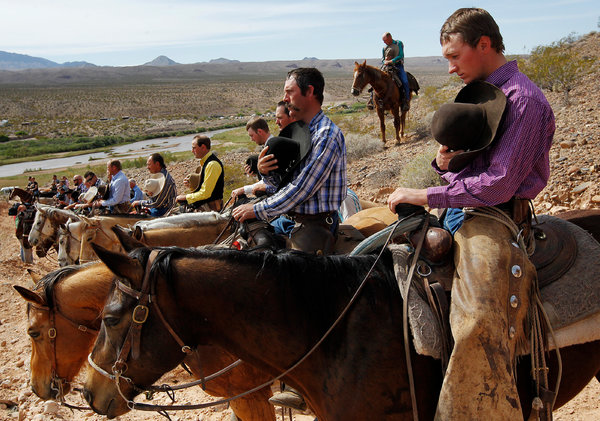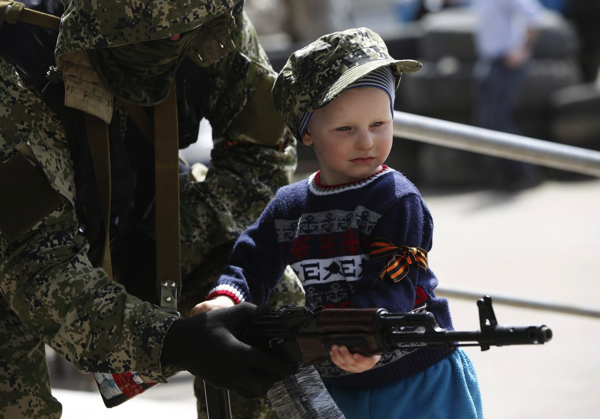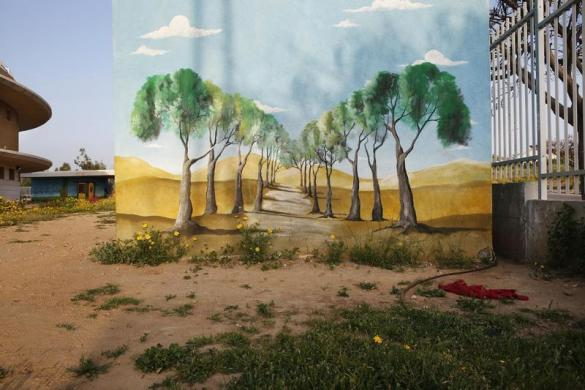Notes
Bad Westerns: That Shot of the Bundy Posse Observing the Anthem
The caption at the New York Times said, “Protesters claiming government overreach in Nevada paused to observe the national anthem.” Which means it didn’t say much at all, except to tell you that the boys are not paying their respects to a fallen cowpuncher or to a good horse that had to be put down.
There really are only two ways to go with this anyway. One leads straight into the news story and from there to the long, delicious, near-perfect opportunity for exposing the full extent of the stupidity, hypocrisy, and greed of the far right. The caption’s reference to the national anthem points the way, but frankly, it’s been done. Check out Jon Stewart or the comments at the Times. There you can savor the many, many, many ways Cliven Bundy’s armed defiance of the rule of law on behalf of a $1,000,000 theft is wrong, wrong, wrong, not to mention flat out incoherent and crazy to boot. That all needs to be said, of course, but it is being said.
Which leaves the other path, one that is cued by the picture itself and may involve a more empathetic response–not to Bundy or the other right wing opportunists, but to the ordinary folk who also are getting dragged into the story. To start with photograph: I can’t help but see a movie still. And not just any movie, but rather some archetypal though unnamed movie. The cowpokes look exactly right, the empty vista rising to distant mountain peaks is just as it should be. And other kinds of emptiness also are typical: no women, Native Americans, cities, highways, or any other sign of civilization and of American diversity are evident. The trickle of water suggests the landscape is just barely liveable, and so a place for continual struggle–whether against the land, other inhabitants, or the government depends on the story.
This close correspondence with stock footage from the Western is all too revealing. Sadly, the defenders of Bundy’s ranch are playing out their parts in a B-movie. Unable for whatever reason to understand the facts or the law or their real interests–although their news source will have a lot to do with that–they are left with mythology to mediate their relationship to a difficult world. Let’s not kid ourselves, it’s tough out there: the work is hard, the water is drying up, the towns are dying, ordinary people are struggling to get by on less disposable income and no job security, and the long term looks only worse yet. Yes, they vote for the party that makes it worse, but that gets back to the mythology with which they are so easily manipulated.
Don’t get me wrong, I’m for full prosecution or Bundy and perhaps others as well. I do think it was wise that the government avoided armed confrontation. ( I wish they would have been equally cautious in some other situations that come to mind involving, shall we say, urban settings.) There is plenty that can be done down the road to enforce the law and thereby not reward anarchy, threats of violence, and stealing from the American people. Even so, I keep coming back to this photograph.
Perhaps there is something pathetic about it. If you don’t want to live in the reality based community, why not try to live in a movie? But that’s not exactly an admirable response to what is a sad situation. The comic alternative? Finding the closest fit among the many possible movies could be a good game in the right crowd. But that’s not going to do justice to the photographer’s art either. It’s precisely because one can’t really see the photograph as an image of the present, much less the future, that makes it seem all the more depressing. What may be a moment of reverent patriotism, however misguided, is also an image of the last cowboys mourning their own demise. They’ll continue to work and to complain about the government, but given their cause, their ability to stand for something big is gone.
There may be another lesson in the comparison as well. In many of those old Westerns, ordinary people were being bilked. Often they would overcome terrible hardships and dangers to persevere in their quest for a good life, only to have it stolen (at least for a while) by some big operator or city slicker who often had the government in his pocket as well. That’s why Chinatown is a Western, in case you were wondering. And while we’re at it, Westerners might want to reflect on why they were always portrayed as being gullible.
And so . . . here we go again. The ordinary folks in the West are being swindled, but not by the US government. (Without federal money and other services such as subsidized grazing fees, many of those Western states would go down hard.) If you want to know who will be taking the money and then disappearing when the times get harder still, just take a look at those who are bankrolling the attacks on big government.
Like I said, we’ve seen this movie before.
— Robert Hariman
(cross-posted from No Caption Needed.)
(photo: Jason Bean/Las Vegas Review-Journal, via AP)



Reactions
Comments Powered by Disqus